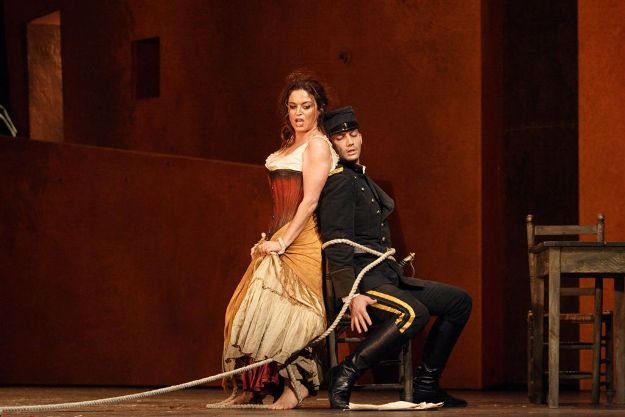|
|
|
|
|
|
|
|
| guardian.co.uk, Monday 11
December 2006 |
| Tim Ashley |
Bizét: Carmen, Royal Opera House, London, 8 December 2006
|
Carmen
|
| Royal Opera House, London |
|
 Nietzsche famously called Carmen "an epigram on
passion," an apt remark given the concentrated subtlety of Bizet's great
score. There's nothing remotely epigrammatic about Francesca Zambello's new
production, however. Nietzsche famously called Carmen "an epigram on
passion," an apt remark given the concentrated subtlety of Bizet's great
score. There's nothing remotely epigrammatic about Francesca Zambello's new
production, however.
Marking the 60th anniversary of the founding of the Royal Opera, it's a big,
gaudy affair, awash with moments of gratuitous excess that threaten, on
occasion, to swamp Bizet in camp. José (Jonas Kaufmann) abseils off a
cliff into the smugglers' lair. A bevy of fat flamenco dancers clatter
away during the chanson bohème, obliterating some of the music altogether.
There's livestock all over the place, while Escamillo (Ildebrando
d'Arcangelo) preposterously rides into Lillas Pastia's tavern on horseback.
Balancing some of this, however, are moments of considerable insight.
Kaufmann establishes the troubled nature of José's sexuality at the outset
by furtively glancing at the tobacco factory long before Anna Caterina
Antonacci's Carmen has issued from its smoky depths. D'Arcangelo sings
the Toreador's song strutting on a tabletop like a whorish catwalk model,
whose goods are available to the most appealing woman on the floor below.
Antonacci, mesmerising as always, plays the title role with a mixture of
self-assured hauteur and provocative sluttishness, lubriciuously pinioning
José by gleefully wrapping her legs around him, then eyeing him with growing
contempt as he breaks down completely during the Flower Song.
There's some fabulous singing. Kaufmann, his voice rearing with desire
and choking with emotional agony, is the finest José to be heard for ages.
Antonacci occasionally sounds less than beautiful, though her insidiously
suggestive delivery makes her utterly compelling. D'Arcangelo, with his
velvety tone, has an animal sensuality. Only Norah Amsellem's Micaela,
tremulous and shrill, disappoints.
Antonio Pappano conducts, deploying some extreme speeds, which confers a
heady languor on some of the more sensual passages, though the pounding
ceremonials of bullfights and marches have a brittle glitter rather than
genuine fire. He takes some liberties with the score, however. A substantial
cut at the opening of fourth act undermines its shape. A couple of sections
of dialogue have oddly been replaced with some of the posthumously written,
inauthentic recitative the work acquired in the decades that followed its
premiere. Given that Carmen is among the most perfect of operas, the changes
are perverse and completely unnecessary. |
|
|
|
|
|
|
|
|
|
|
|
|
|
|
|
|
|
|